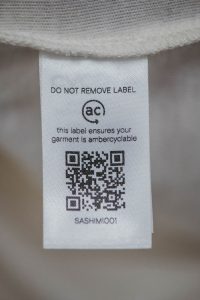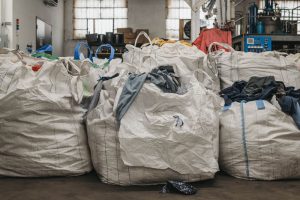 GLENDALE, Calif. — May 25, 2021 — Avery Dennison has announced its partnership with Ambercycle, a Los Angeles-based post-consumer garment recycler. The collaboration demonstrates Avery Dennison’s complete digital care label solution. This sees intelligent care labels being attached to Ambercycle’s garments. The labels feature a QR code that links to an app offering a digital experience that details how that specific garment was produced and how it should be looked after. The app is powered by Avery Dennison’s powerful data platform.
GLENDALE, Calif. — May 25, 2021 — Avery Dennison has announced its partnership with Ambercycle, a Los Angeles-based post-consumer garment recycler. The collaboration demonstrates Avery Dennison’s complete digital care label solution. This sees intelligent care labels being attached to Ambercycle’s garments. The labels feature a QR code that links to an app offering a digital experience that details how that specific garment was produced and how it should be looked after. The app is powered by Avery Dennison’s powerful data platform.
Legally, all garments sold must have a physical care and content label to communicate product information, such as washing instructions and material composition. This information is not just helpful for consumers, it is also vital for recyclers and resellers as it allows them to easily identify what the garment is made of after the original owner has disposed of it.
Avery Dennison’s new digital care label solution is a significant innovation as it allows for traceability and transparency across the supply chain. In addition, new digital revenue streams become possible for the brand as additional products can be marketed to the consumer via this new direct-to-consumer touchpoint.
Currently many consumers remove the physical care label, while brands underutilize it. This increases the risk of the garment ending up in landfill rather than being resold or recycled. In contrast, the new digital label helps advance the circular economy as recyclers can be confident of composition and resellers will be able to check authenticity.
 Ambercycle, Avery Dennison’s first partner for its digital care label, converts end-of-life textile ‘waste’ into new yarns for apparel brands and manufacturers. Its garments are created from polyester textiles that were destined for landfill, but are instead broken down to a molecular level, turned into pellets, and then spun into Cycora™ yarns which can be processed by garment manufacturers in the same way as virgin yarns.
Ambercycle, Avery Dennison’s first partner for its digital care label, converts end-of-life textile ‘waste’ into new yarns for apparel brands and manufacturers. Its garments are created from polyester textiles that were destined for landfill, but are instead broken down to a molecular level, turned into pellets, and then spun into Cycora™ yarns which can be processed by garment manufacturers in the same way as virgin yarns.
Sarah Swenson, global senior sustainability manager, Avery Dennison RBIS, shared: “These labels are an exciting development, as consumers can discover their garment’s story, see how it was made, and understand the environmental benefits from their choice. When the consumer no longer needs the item, they can scan the QR code to see what needs to happen to properly dispose of the garment. In this case, if they send the garment back to Ambercycle it will be recycled back into a new textile. Brands can benefit from access to a deeper level of data both in terms of shopper engagement and also understanding just how many items remain in the circular economy.”
Michael Hu, director of digitalization, Avery Dennison RBIS added: “Brands are looking to deepen their customer engagement and lighten their environmental impact. This allows the apparel industry to use the garment itself as a stepping-stone for a new form of storytelling. Avery Dennison is providing a total solution — a physical trigger to a digital experience, a data platform, and applications for brands, consumers, and the wider apparel industry to utilize.”
Shay Sethi, CEO, Ambercycle stated: “Our raw materials are end-of-life textile clothing that we regenerate into new cycora yarns and fabrics. A key concern in this process is the upfront identification and sorting the different types of fabrics to inform the best end-of-life solutions. A digital care label is essential to embracing the broader vision for circularity, as it enables a more streamlined and scalable way for us to regenerate material. As we built the physical infrastructure to take in and reprocess material, we knew we had to think about the digital infrastructure to enable full circularity. The digital care labels in collection one will help us track cycora garments so that their path to be ambercycled again at their end of life is seamless. Together with Avery Dennison, we believe this will be a transformative step forward into the inevitable circular future.”
This partnership is the first in a series of innovation-based collaborations that underscore Avery Dennison’s commitment to a circular apparel supply chain and support its 2030 sustainability goals.
Posted May 25, 2021
Source: Avery Dennison




